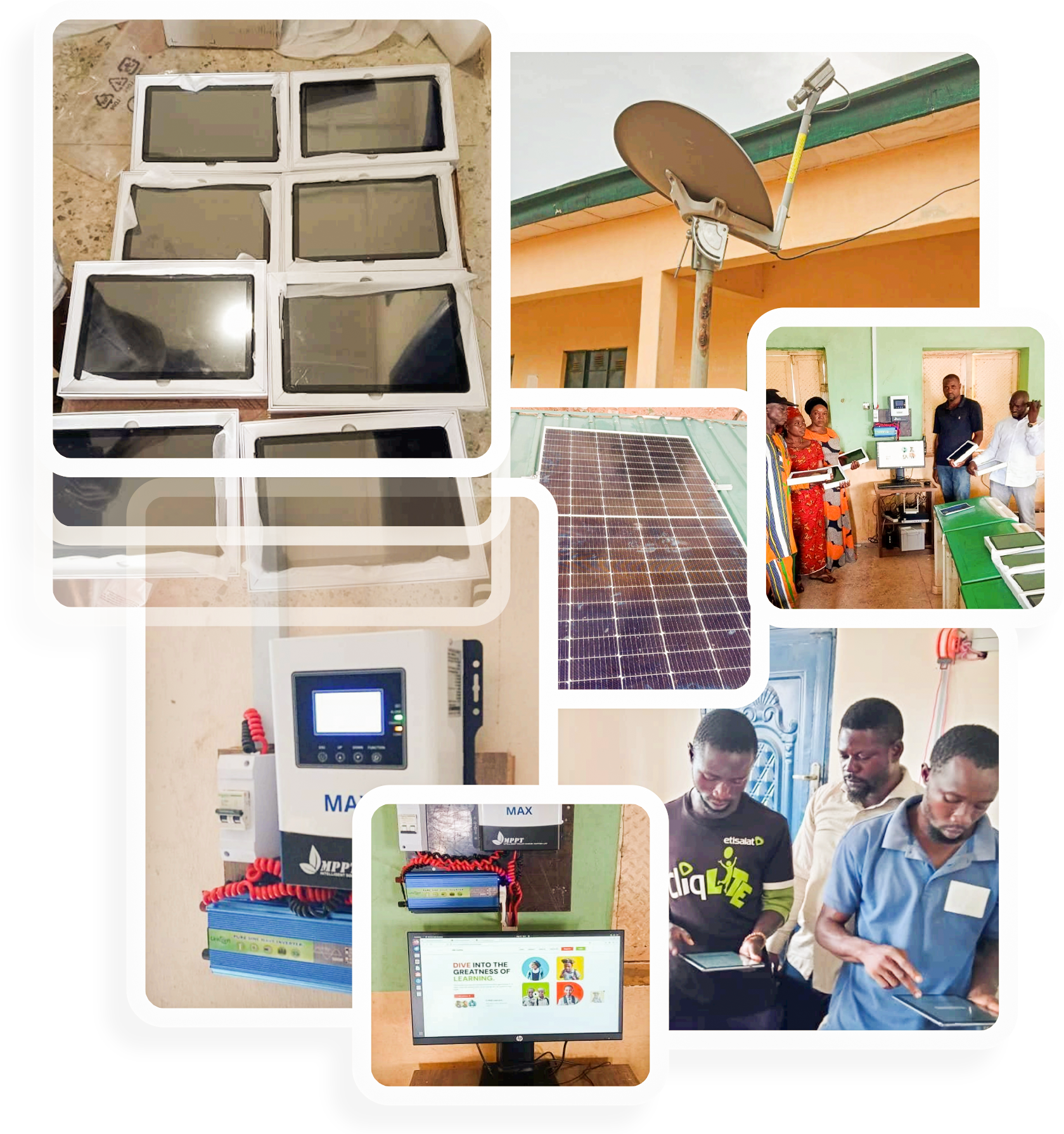The Universal Basic Education Commission (UBEC) is committed to enhancing the quality and accessibility of education across the nation. Recognizing the challenges posed by limited infrastructure, unsustainable internet connectivity and unreliable power supply, UBEC is implementing a Solar-powered satellite based e-learning system in 109 schools across the 36 States in Nigeria. This innovative initiative aims to provide continuous and high-quality educational content to primary pupil/students in even the most remote areas of Nigeria.
Solar Power Generation:
Solar Panels : High-efficiency photovoltaic panels installed at each educational site to capture sunlight and convert it into electrical energy.
Energy Storage : Advanced battery systems store excess energy generated during the day to ensure a continuous power supply during the night and cloudy periods.
Power Management Unit: An intelligent power management system regulates the distribution of electricity to various components of the e-learning system, optimizing energy usage and ensuring system reliability.
Satellite Connectivity :
Engagement Strategy - Satellite Dishes: Small, robust satellite dishes installed at each site to establish a reliable internet connection via satellite communication.
Modems and Routers: State-of-the-art modems and routers facilitate high-speed data transmission, ensuring that educational content is delivered smoothly and efficiently to students and educators.
E-Learning Platform:
Content Management System (CMS) : A user-friendly CMS that hosts a wide range of educational materials, including textbooks, videos, interactive lessons, and assessments aligned with the national curriculum.
Learning Management System (LMS) : An LMS that enables educators to deliver lessons, track student progress, and provide feedback. It supports various teaching methods, including live streaming, recorded lectures, and collaborative projects.
User Devices: Tablets, laptops, or desktop computers provided to students and teachers to access the e-learning platform. These devices are designed to be durable and energy-efficient, suitable for use in various environmental conditions.
Accessibility and Inclusivity:
The system ensures that students in rural and underserved areas have access to the same quality of education as those in urban centers.
Multilingual support and localized content cater to the diverse linguistic and cultural backgrounds of Nigerian students.
Sustainable and Reliable Power Supply :
Solar power generation eliminates dependency on the often unreliable national grid, providing a consistent power source for educational activities.
The use of renewable energy aligns with Nigeria’s sustainability goals and reduces the carbon footprint of educational facilities.
High-Quality Educational Content:
The e-learning platform offers a comprehensive range of interactive and engaging educational resources that enhance the learning experience.
Regular updates and additions to the content library ensure that students have access to the latest information and learning tools.
Enhanced Teaching and Learning Experience:
Teachers can leverage technology to create more dynamic and effective lesson plans, catering to different learning styles and needs.
Students benefit from interactive lessons and real-time feedback, which fosters a more engaging and personalized learning experience.

Engagements
Participating States
Sites / Schools
Happy Users
Site Assessment and Preparation:
Conduct thorough assessments of selected sites to determine the optimal placement of solar panels and satellite dishes.
Ensure that each site is equipped with necessary infrastructure, such as secure housing for equipment and adequate shading for solar panels.
Installation and Training :
Deploy teams of skilled technicians to install the solar power and satellite systems, ensuring that all components are correctly set up and operational.
Provide comprehensive training for teachers and administrative staff on using the e-learning platform and maintaining the equipment.
Monitoring and Maintenance:
Implement a robust monitoring system to track the performance of the solar power and satellite systems, identifying and addressing any issues promptly.
Schedule regular maintenance visits to ensure the longevity and optimal performance of the equipment.
Community Engagement and Support:
Engage with local communities to raise awareness about the benefits of the e-learning system and encourage their support and involvement.
Establish support centers to provide ongoing technical assistance and resources for teachers and students
Improved Educational Access: Increased access to quality education for students in remote and underserved areas, reducing educational disparities across Nigeria.
Enhanced Learning Outcomes: - Higher student engagement and improved academic performance due to the interactive and engaging nature of the e-learning platform.
Empowered Educators: - Teachers equipped with advanced tools and resources to deliver effective and impactful lessons.
Sustainable Development: - Contribution to Nigeria’s sustainability goals through the use of renewable energy and reduction of reliance on fossil fuels.
Conclusion :
The solar-powered satellite system for e-learning is a transformative initiative by UBEC, aimed at bridging the educational divide in Nigeria. By partnering with Nas Navigation and leveraging our renewable energy and cutting-edge technology, this system ensures that every child, regardless of location, has access to quality education. This project not only addresses current educational challenges but also sets a foundation for a more inclusive and sustainable future.